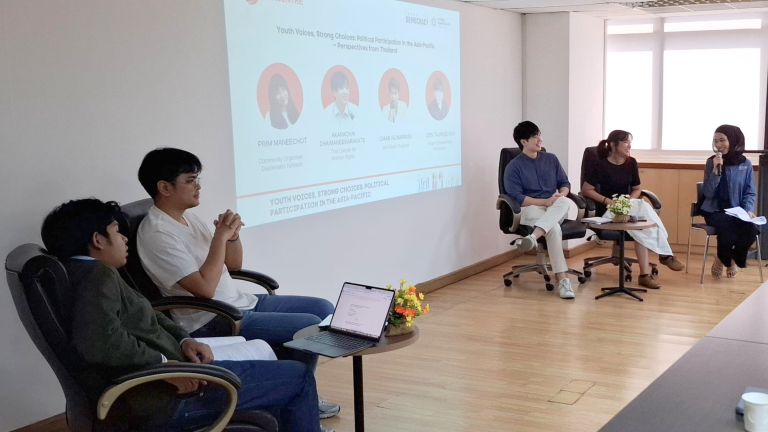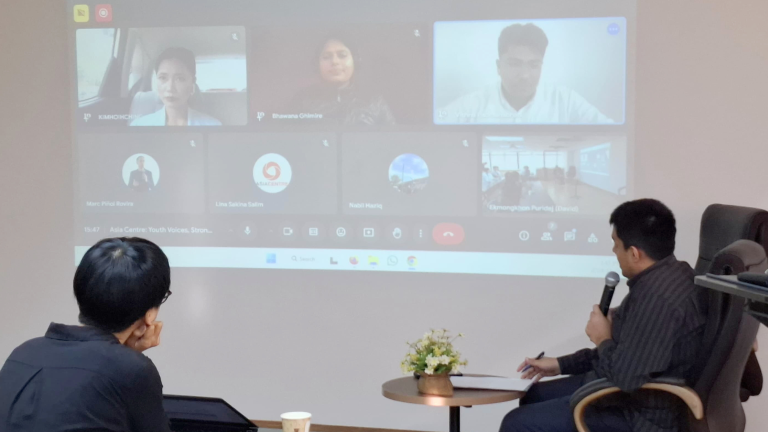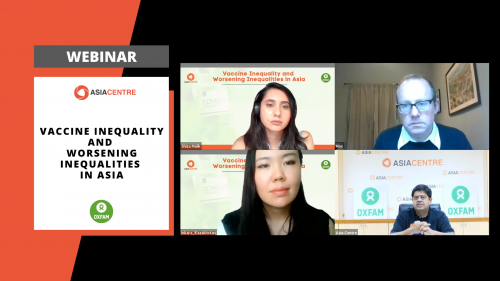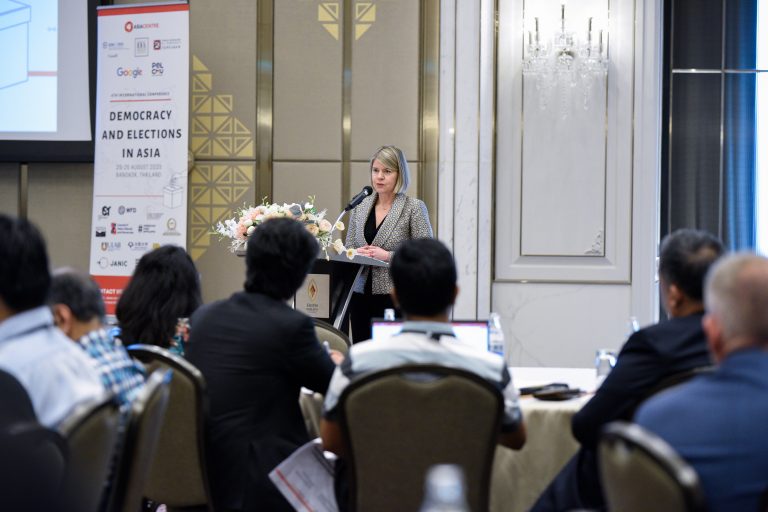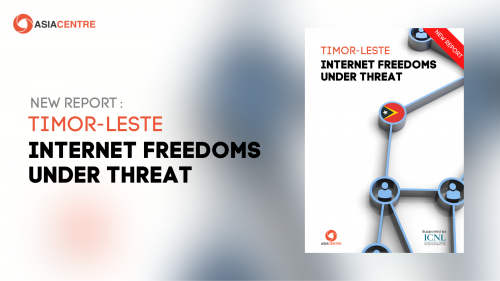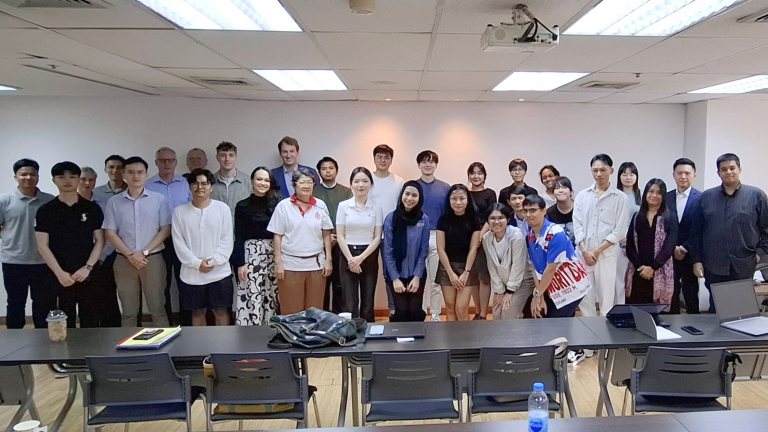
Providing a platform for 28 youth representatives to share their insights and challenges surrounding young people’s representation in democratic systems across the Asia-Pacific region was the key achievement of the Asia Centre-led regional dialogue “Youth Voices, Strong Choices: Political Participation in the Asia-Pacific”.
Co-convened with the Global Democracy Coalition and Club de Madrid on 26 November 2024, the event brought together two youth networks: speakers from the Oxfam Young Leaders Fellowship Programme and the Women and Youth in Democracy Initiative (WYDE) Network of Young Decision-makers, who joined in a hybrid manner. Additionally, representatives from IGOs, INGOs, and CSOs based in Thailand were also present. Having total participation of 41 representatives, the event offered an opportunity for all present to share their views, present their activities, and engage with youth beneficiaries.
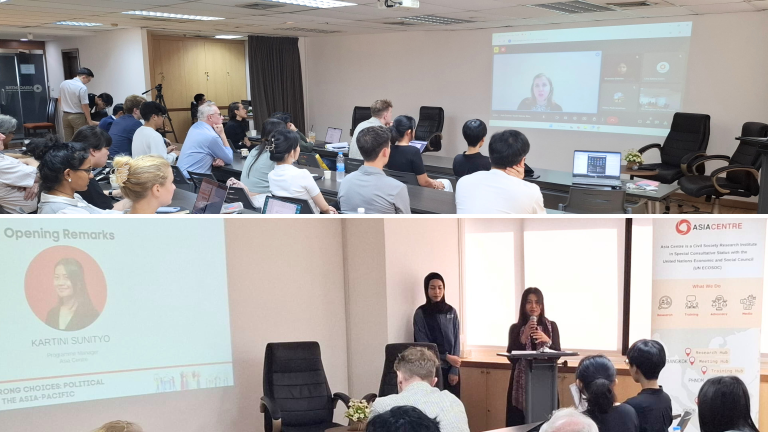
The event began with opening remarks from Elisenda Balleste Buxo, Project Coordinator of the Global Democracy Coalition at International IDEA, emphasising the significant role the coalition plays in advancing democracy in the Asia region, which, as the most populous part of the world, is grappling with challenges related to democracy backsliding at the same time with youth disengagement from politics.
This was followed by remarks from Kartini Sunityo, Programme Manager at the Asia Centre, who discussed the Asia Centre’s work in the region, and briefly updated the participants on the publication of podcasts, social media posts for advocacy and awareness under the #ThankYouDemocracy Campaign, she also emphasised on the need to hear from the youths about their concerns for democracy and democratic participation in the region, and expressed her gratitude to all the participants.
The first panel “Youth Voices, Strong Choices: Political Participation in the Asia-Pacific – Perspectives from Thailand”, featured four speakers from Thailand who discussed efforts to encourage youth participation in political and social causes, it was moderated by Fatin Arwaeputeh, the Programme Coordinator at Asia Centre.
- Prim Maneechot, a Community Organizer from the Daybreaker Network, emphasised the importance of empowering young people with the freedom to initiate and determine their activism.
- Akarachai Chaimaneekarakate, a Thai Lawyer specialising in human rights, stressed the need to equip youth with legal knowledge and skills to protect them from potential rights violations.
- Don Tajaroensuk from the People Empowerment Foundation addressed the impact of systemic corruption on marginalised youth, highlighting how the legal system often fails to offer protection due to the way their situations are defined under the law.
- Omar Nunarnun from We Watch Thailand discussed the challenges young people face in volunteering for political participation.
Together, the panellists stressed the need for social activists to reorganise the democratic movement from within and address obstacles to hinder greater youth involvement in present-day politics.
The second panel “Youth Voices, Strong Choices: Political Participation in the Asia-Pacific – Perspectives from Young Leaders in the Region”, featured three speakers from South Asia, it was moderated by Ekmongkhon Puridej, Researcher at Asia Centre. Young leaders from across the region reflected on the similarities and differences between their communities and Thailand.
- Vishnuvardhanan Padmanabhan, a Young Leader from Sri Lanka, reflected on the recent surge in youth mobilization through protests, which led to unprecedented youth engagement in the elections earlier in November. This movement mirrors the power of youth seen in Thai youth movements. However, sustaining this momentum remains a challenge. He advocated for inclusive initiatives that reach rural communities and economically disadvantaged groups.
- Bhawana Ghimire, a legal activist from Nepal, highlighted the lack of representation from working-class and marginalized communities. She also emphasised on the structural economic and political barriers that hinder youth participation in Nepal’s economic and political spheres. This issue, similar to those discussed by the first panelist, resonates with the challenges faced by Thai activists.
- Seena Kimhoiching, a young ethnic tribal advocate from northeast India, focuses on vulnerable rights. She emphasised on the critical role of student movements and civil society collaborations in fostering collective action. She highlighted a growing shift in youth engagement, driven by dissatisfaction with governance, and emphasized the critical role of student movements and civil society collaborations in fostering collective action.
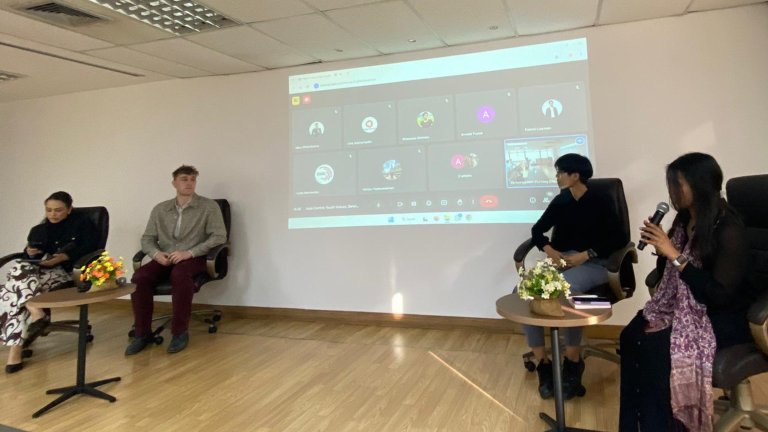
Lastly, the third panel “Building the Capacity of Youth Programmes by Understanding their Concerns”, featured three regional speakers, it was moderated by Kartini Sunityo, Programme Manager at Asia Centre. The panel brought together organisations those who have initiated and implemented youth capacity-building programs for the participants to hear how such programs can be further improved to foster youth political participation.
- Kewalin Sa-ngapet from the Friedrich Naumann Foundation in Thailand stressed the importance of making youth programs inclusive, ensuring access for all young people, regardless of their economic background, gender, or education level, and fostering equal opportunities
- Jo-Anna Henley from the Women and Youth in Democracy Initiative (WYDE) Network of Young Decision-makers in Malaysia highlighted the challenges of youth activism, particularly burnout, and emphasised the need for sustainable programs with long-term support to maintain momentum in political movements.
- Tyler Esch from the International Republican Institute in Thailand reflected on the success of capacity-building programs, noting how networks among youth advocates have facilitated collaboration and sustained political engagement, underscoring the importance of nurturing these connections for continued advocacy and action.
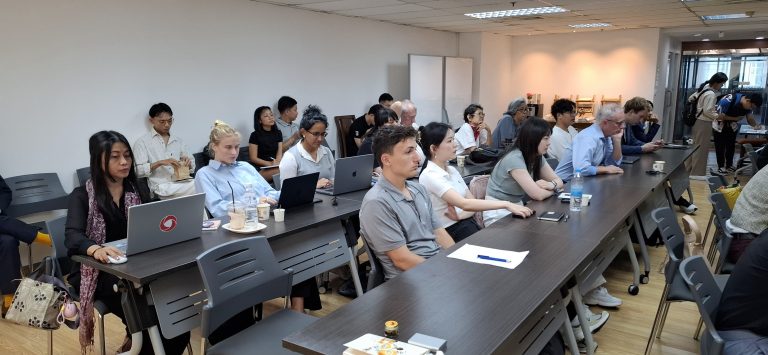
All in all, the regional dialogue “Youth Voices, Strong Choices: Political Participation in the Asia-Pacific” provided an invaluable platform for young people to engage in discussions about enhancing youth political participation across the Asia-Pacific region. The event highlighted critical issues such as the need for inclusivity in youth programs, ensuring equal opportunities for all young people regardless of their background, and fostering long-term, sustainable support for youth movements to prevent burnout. Participants emphasised the importance of regional collaboration, with young leaders sharing their diverse experiences and challenges while working to influence political processes in their respective communities. This exchange of ideas underscored the shared commitment to strengthening youth involvement in decision-making and promoting democratic processes in the region.
The regional dialogue also demonstrated the importance of building strong networks and capacity-building programs to sustain youth engagement in political action, including empowering young people with knowledge, skills, and support systems needed for long-term impact. Emphasis was placed on improving legal knowledge alongside democratic knowledge, addressing corruption, or providing sustainable support for activism.
The regional dialogue reinforced the need for a holistic approach to nurturing youth leaders who can effectively contribute to democratic governance. The event underscored that fostering inclusivity, collaboration, and sustainability will be key to ensuring that youth voices continue to play a pivotal role in shaping the future of political participation across the region and should be supported via active political and electoral participation.
The regional dialogue is part of the Asia Centre’s activity on the Global Democracy Campaign in the region which ends in December 2024. The project covers a series of thematic online activities under the #ThankYouDemocracy Campaign to address the youth’s voices on democracy and democratic participation in the Asia Pacific region.
Asia Centre is a civil society research institute in Special Consultative Status with the United Nations Economic and Social Council. It serves as a knowledge partner and undertakes evidence-based research as well as provides capacity-building training for end beneficiaries. If you would like to collaborate with the Centre, please send an expression of interest to contact@asiacentre.org.
Follow Asia Centre’s social media channels for more information.

